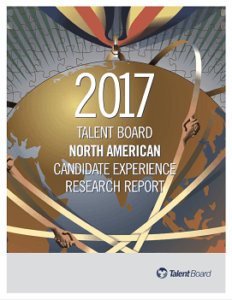 How’s your candidate experience looking?
How’s your candidate experience looking?
And just as importantly, how does it stack up to your competition?
In this year’s Talent Board candidate experience 2017 research, we heard from 220,000 job seekers from around the world who applied for jobs at more than 300 employers.
Through these candidate surveys, we built a picture of the current state of candidate experience, as well as the tools, processes and technologies employers use to shape that experience.
So what’s the big picture result?
We took one step forward. And…one step back.
What’s Improving
Here’s the good news for people obsessed with candidate experience (like me): Over the past three years, we’ve seen an overall incremental positive trend among very satisfied candidates. Candidates who give their experience 5/5 stars say they’ll increase their business relationship with the employer. That means they’re likely to apply again, refer others and buy stuff. That trend is true across all three global regions we survey.
Figure 1. A Great Candidate Experience

What’s Not
While happy candidates are more likely to stay loyal to employer companies, unhappy candidates are more likely to sever their relationships with companies. More 1-star candidates (who rate their candidate experience at just one out of five stars) say they’ll sever their business relationship. This is not good news. Candidates who are less likely to apply again, refer others and buy stuff if can certainly impact the business bottom line.
Figure 2. A Poor Candidate Experience

So what’s the takeaway for employers?
Improving candidate experience is a long game, with a lot of ups and downs along the way. Asking candidates (most of whom don’t get the job) to rate their experience isn’t for the faint of heart. But the insights you learn are worth it.
If you’re dedicated to improving your organization’s candidate experience, here are four lessons you can learn from this year’s research.
What We Can Learn from the 2017 Candidate Experience Research
Open New Communication Channels
Corporate marketing and customer service aren’t the only teams today using social media channels and websites to serve “customers.” Savvy employers are making their recruiting teams available to answer questions during live chats on career sites and social media, as well as experimenting with chatbots to answer general employment questions. The latter frees up the recruiting teams to have more hands-on time with potential candidates already in play.
Walk in the Candidate’s Shoes
Employers must be willing to admit that their existing application process may not be working. In order to think about the application process from the candidates’ perspective, more and more organizations are thankfully applying for their own jobs, especially the CandE Award winners, and are reaping the benefits of incrementally improving their application process.
To Set Yourself Apart, Focus on Communication and Feedback
CandE Award winners continue to differentiate themselves by communicating more with candidates, giving candidates feedback earlier in the recruiting process, and asking candidates for feedback even before they apply for a job. Most candidates who have an overall “very poor” 1-star and 2-star candidate experience — representing tens of thousands of candidates in the Talent Board research — are getting very little if any consistent communication or feedback, a missed opportunity in a highly competitive talent marketplace.
Remember the Connection Between Candidate Experience and the Bottom Line
As I shared, candidates who had a negative overall experience say they will take their alliance, purchases and relationship somewhere else. This means a potential loss of revenue for consumer-based businesses, and a loss of referral networks for all companies. Plus, it means losing potential future-fit and silver-medalist candidates. However, the good news is that those who had a great overall experience say they’ll definitely increase their employer relationships – they’ll apply again, refer others and make purchases when applicable. These aren’t just the job finalists either, or those hired, but the individuals who research and apply for jobs and aren’t hired. If you need a data point to tie candidate experience to business results, this is it.
We’re already looking ahead at next year. If you’re interested in participating in the 2018 Talent Board Candidate Experience Awards benchmark research program, you can register your organization now.
Post Views: 1,227